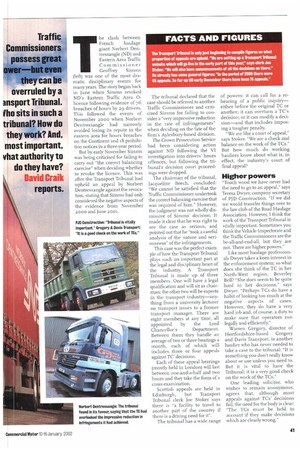Traffic Commissioners possess great ower—but even they can be overruled
Page 41

If you've noticed an error in this article please click here to report it so we can fix it.
by a afisport Tribunal. Ilho sits in such a tribunal? How do they work? And, most important, vhat authority to do they have? David Craik reports.
The clash between French haulage giant Norbert Dentressangle (ND) and Eastern Area Traffic Commissioner Geoffrey Simms (left) was one of the most dra
matic disciplinary events for many years. The story began back in June when Simms revoked ND's Eastern Traffic Area 0 licence following evidence of 76 breaches of hours by 29 drivers.
This followed the events of November 2000 when Norbert Dentressangle had narrowly avoided losing its repute in the eastern area for hours breaches on the Continent and 18 prohibi tion notices in a three-year period.
But by early November Simms was being criticised for failing to carry out "the correct balancing exercise" when deciding whether to revoke the licence. This was after the Transport Tribunal had upheld an appeal by Norbert Dentressangk against the revoca
tion, stating that Simms had only considered the negative aspects of the evidence from November 2000 and June 2001.
The tribunal declared that the case should be referred to another Traffic Commissioner and criticised Simms for failing to consider a "very impressive reduction in the rate of infringements" when deciding on the fate of the firm's Aylesbury-based division.
The Crown Prosecution Service had been considering action against ND following the VI investigation into drivers' hours offences, but following the tribunals decision court proceedings were dropped.
The chairman of the tribunal, Jacqueline Beech, concluded; "We cannot be satisfied that the Traffic Commissioner undertook the correct balancing exercise that was required of him." However, the judgment was not wholly dismissive of Simms' decision. It made it clear that he was right to see the case as serious, and pointed out that he "took a careful analysis of the nature and seriousness" of the infringements.
This case was the perfect example of how the Transport Tribunal plays such an important part at the legal and disciplinary heart of the industry. A Transport Tribunal is made up of three members. One will have a legal qualification and will sit as chairman; the other two will be experts in the transport industry—anything from a university lecturer on transport issues to a former transport manager. There are eight members at any time, all appointed by the Lord
Chancellor's Department. Between them they handle an average of two or three hearings a month, each of which will includes three or four appeals against TC' decisions.
Each of these appeal hearings (mostly held in London) will last between one-and-a-half and two hours and they take the form of a cross-examination.
Scottish appeals are held in Edinburgh, but Transport Tribunal clerk Joe Stoker says there is "a facility to travel to another part of the country if there is a driving need for it". The tribunal has a wide range of powers: it can call for a rehearing of a public inquiry— either before the original TC or another; it can overturn a TC's decision; or it can modify a decision—and that includes imposing a tougher penalty.
"We are like a court of appeal," says Stoker. "We are a check and balance on the work of the TCs." But how much do working hauliers know about what is, in effect, the industry's court of final appeal?
Higher powers
"Touch wood we have never had the need to go to an appeal," says Teresa Dwyer, company secretary of PJD Construction. "If we did we would transfer things over to the law club of the Road Haulage Association. However, I think the work of the Transport Tribunal is vitally important. Sometimes you think the Vehicle Inspectorate and the Traffic Commissioners are the be-all-and-end-all, but they are not. There are higher powers.
Like most haulage professionals Dwyer takes a keen interest in the enforcement system; so what does she think of the TC in her North-West region, Beverley Bell? "She does seem to be quite hard in her decisions," says Dwyer. "Perhaps TCs do have a habit of looking too much at the negative aspects of cases. However, they do have a very hard job and, of course, a duty to make sure that operators run legally and efficiently."
Warren Gregory, director of Hertfordshire-based Gregory and Davis Transport, is another haulier who has never needed to take a case to the tribunal: "It is something you don't really know about or use unless you need to. But it is vital to have the Tribunal; it is a very good check on the work of the TCs."
One leading solicitor, who wishes to remain anonymous, agrees that, although most appeals against TCs decisions fail, the need for the body is clear: "The TCs must be held to account if they make decisions which are clearly wrong."
















































































































































